#and i'm just interpreting all of this in a way that fits my leitmotif
Explore tagged Tumblr posts
Text
on the idea of godhood and my one giant lore catchall post
spoilers for dragon age, inquisition, and trespasser dlc, etc.
this plays off of a post i read recently (i didn't remember to save it) that referred to a word used in a codex entry that basically corresponds to 'the idea and worship of power/godhood made real', as in the worship of a figure, at sufficient quantities, granting them real power. the post theorized this was how the evanuris went from being mere generals in a war to being worshipped as mage-gods, same for solas and possibly mythal. i believe it also mentioned the idea that the way the 'gods' were worshipped would've affected the gods' demeanor as well, though that becomes more of a chicken vs egg situation.
anyway. here's some thoughts i've been having.
according to solas, 'Falon'Din's vanity and desire for worshipers was so great he started brutal wars to gain more, killing all who would not bow to him.' it's unknown if the other evanuris did similar things, but the general idea is that: gain worshippers to gain power through their worship.
the chantry's goal '...is to spread the Chant of Light to all four corners of the world and to all races... Once all peoples have accepted the Chant and practice its teachings, the Maker will return and restore the world to its former glory.' (emphasis mine, quoted from the wiki)
so.
would the idea of 'worship of power/godhood made real' apply to this as well? that the meaning of the chantry insisting on spreading the chant of light to all of thedas is to mean that once everyone/enough people worship and believe in the maker, he will have power (again) to affect the world, whether the chantry knows this or not?
going down this line of thought leads me to think.. regardless of whether the maker is Real God or a Powerful Mage Worshipped to Godhood, the concept of the Original Sin would line up with a very primeval 'had his children/worshipers turned away from him, thus diminishing his power' that may have happened before the actual original sin.
would the same apply to how the qunari leaders try to spread the teachings of the qun? as far as i can tell, the qun maybe honors the askhaari koslun, but he isn't venerated as a god or as in having powers aside from the tales of his visions and prophecy regarding his teachings. i think. i did a brief skim on the wiki.
in light of it all, this could be an aspect of atheism trying to quell all the powers vying for godhood in the world. don't believe in gods! any of them! you'll give them power! all you need is order and obedience!
in works, in theory.
anyway, the thing that's been on my mind the MOST:
the Forgotten Ones, the void, and the blight. bear with me.
All that the Maker has wrought is in His hand Beloved and precious to Him. Where the Maker has turned His face away, Is a Void in all things; In the world, in the Fade, In the hearts and minds of men.
(emphasis mine, quoted from the wiki as from the canticle of threnodies)
i've read and may or may not subscribe to the theories about the blight originating from the void, from the implication of andruil going hunting in there for the Forgotten Ones and becoming Infected, bringing a plague back to her lands. assuming this story is true, then that is where the initial taint came from that could have affected the primeval thaig in the free marches (it being somewhat close to the forest of arlathan could lend credence to this) before the tevinter magisters ever entered the fade.
according to the wiki, the codex for fen'harel gives us that 'Forgotten Ones are a dark mirror presiding over the worst aspects of existence: disease, terror, spite and malevolence. They serve not as shepherds of the elves, but rather as figures of fear and dread.'
SO. IF:
andruil's plague = blight the plague = came from the void the void = either 'the maker turned his face from it' or 'the maker is not present here' The Forgotten Ones = worst aspects of existence, reside in or were born of the void the evanuris = aspects of the maker? (i THINK morrigan mentions this idea)
the evanuris as the relatively more positive aspects of the maker warring against the forgotten ones, the objectively more negative aspects of the maker, while both try to spread their versions of.. idealogy, i guess?
i say this because i question what the whole point of the blight is. but if the blight comes from the void, and the void is where the forgotten ones are or live or come from, and if the forgotten ones are.. possibly.. negative aspects of the maker... it's less that 'the maker is sending us trials by cleansing fire via the blights' and more 'this splintered part of the maker (the forgotten ones) wants to spread this negative blight to make themselves more powerful'.
the evanuris, though relatively More Positive, also apparently just want to make Themselves more powerful (because ambition can be both good and bad). and maybe initially the war between the evanuris/ancient elvhen and the Forgotten Ones WAS a war against the negative aspects of the maker, to prevent the bad from overtaking the good.
(but perfectly good and perfectly bad are in no way perfection, in and of themselves)
solas says the evanuris were mortal. there's theories that they're spirits, whose identities depend on how they are remembered and worshiped.
i say: who is to say that solas's insistence on their mortality ISN'T just another way to alter their state, to MAKE them mortal just be believing that they are. spirits can alter their reality. and with how cole made himself corporeal, the idea that spirits can just become Real and Physical if they Believe it (or are believed in?) hard enough has implications on, maybe, how some things came to be:
the evanuris: the practice of vallas'lin dedicating (unhappy, ungrateful) slaves to the evanuris affecting their later behavior (madness, vanity, betrayal) the avvar gods: powerful spirits(?) given stewardship over the avvar clans by their reverence and worship. one can even be bound to a dragon, just like how the grey wardens bound demons. just like how you could bind cole, if you wanted. the void: did the maker turn away from those dark parts of himself, whether in fear or shame? did they fester in resentment and give rise to things void of love? the forgotten ones: because every light makes a shadow, whether intended or otherwise. these shadows are black and forgotten, and they want you to know that you are, too. the dragons you fight: were they heroes worshipped to dragon-godhood, like the ancient human tribes of old did? which hero was hakkon made to possess and subvert? which angry soul perverted hakkon's purpose? the old gods: who created them, and for what? (i have ideas.) the titans: did they make the dwarves or did the dwarves make them? (i'm thinking about this) the archdemons: like demons. a spirit's purpose, perverted. the blight: a perversion of life? or the spiritual equivalent of terraforming the world for an incompatible race? the inquisitor: are you who you are or are you what they believe you to be? how do you know? you are, inevitably, a product of society and what it expects from you. the maker: did someone make him, too? what did they expect of him?
...and, you know, maybe i'm a bit crazy to theorycraft in this direction. but you know what?
i wonder if the impression of teyrn loghain on the fade is ultimately that of a traitor or a hero. i suppose that depends on how you, the player, altered his story and what people believed of him, how they remembered him. if he is remembered as both, is he both? can he only be one?
does this make you a spirit? does that make you a Maker?
#dragon age: inquisition#dragon age inquisition#dai#dragon age headcanon#theorycrafting#evanuris#the maker#the forgotten ones#avvar gods#the blight#i've discovered my leitmotif. it's the futility in the pursuit of duty and perfection#and i'm just interpreting all of this in a way that fits my leitmotif#so that's where all the weird connections come from#also i love the idea of nesting dolls of godcreators.#is this related to tnil? who knows. :)#i have so many philosophical spiritual musings about all this and i know i'll never get to the meat of it in fic#this is the text i need to sub in my writing. the subtext if you will.#i don't know what bioware intended but#the parallels between us as the players of dragon age and the spirits in the dragon age setting (thedas) make me Feel Things#longpost#couldn't resist.. theorycrafting....
19 notes
·
View notes
Text
Holy Kittens, Y'all: My Favorite Good Omens Moment Has Gotten EVEN MORE ROMANTIC
Okay so I wrote this post about my favorite moment in Good Omens, and the stuff people are pointing out in the reblogs and comments is blowing my freaking mind, and I HAVE to show you how beautifully this all fits together, like I am flailing at my desk about this.
@vidavalor points out this gif from @soft-ange-aziraphale [Source]:
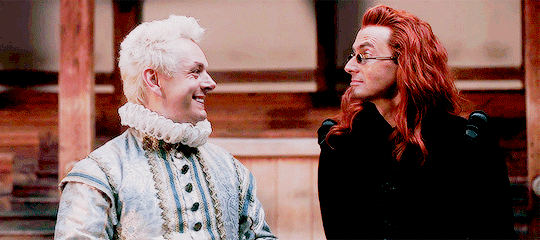
Here it is in sequence (gifs 1-4 from Fuck Yeah Good Omens):
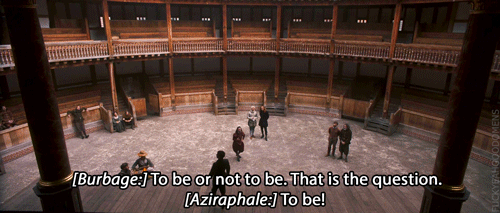
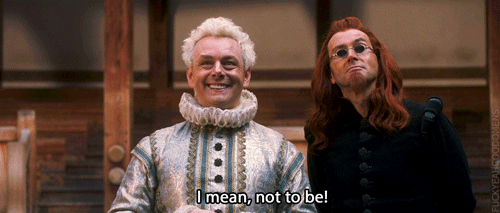
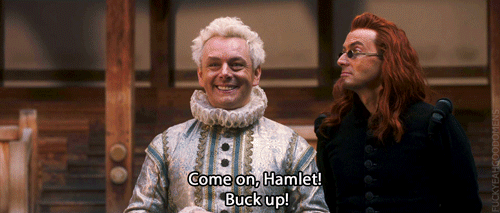

I can't stop laughing over Aziraphale's smile, which shows, as @quoththemaiden says, that he's "utterly delighted with himself" and knows perfectly well that he's minxing Crowley; and this tiny extension of the moment convinces me even more that Crowley is desperately fighting a smile himself here.
Actually there's a lot in @quoththemaiden's comment that's insightful and well-put:
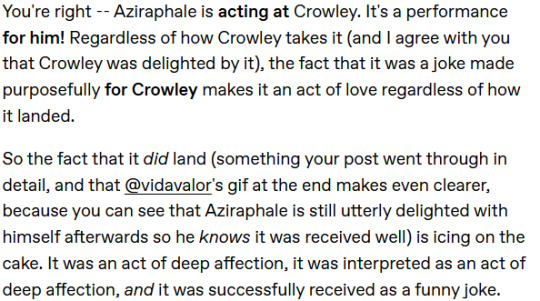
Totes agree with all of this.
And then. AND THEN!
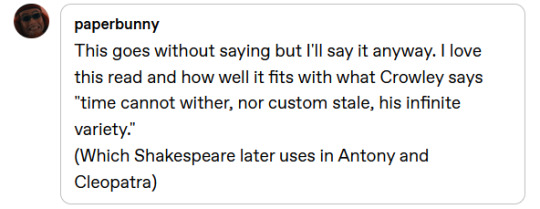
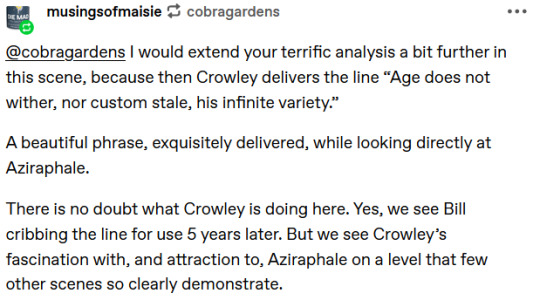
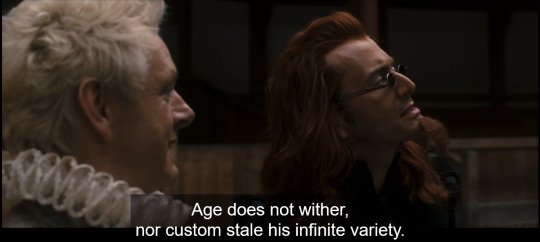
I knew Crowley was trying to communicate something with this Shakespeare line, but I didn't know what until @paperbunny and @musingsofmaisie put it out there: Crowley is complimenting Aziraphale here, telling him he's enjoying being in Aziraphale's company, telling him his humor worked.
Remember how I keep banging on about how much equivocation Crowley does? This is more equivocation. In 1601, Richard Burbage was 34 years old, so age hasn't had the chance to wither his infinite variety yet. The stupidity of demons and the ignorance of angels regarding the human aging process prevent surveillance from noticing the poor applicability of this line to Burbage, but since the first half of the line fits Aziraphale (who does not age at all) more than Burbage (who is merely not yet old) it stands a chance of indicating to Aziraphale that Crowley is speaking about him. And the underlying true meaning of this equivocal statement would be A DIRECT RESPONSE TO MY FAVORITE MOMENT: Even though I have known you so long, you still surprise and delight me.
(Crowley's Antony & Cleopatra line also accomplishes something else important: it gets William Shakespeare to go away so they can speak privately, because Shakespeare doesn't want them to see him writing it down.)
A Dip Into Speculation
I don't think the evidence for it is binding enough to say for sure, because the evidence is really just that it fits together so nicely and lines up so well with A&C's coded romantic messages in 1793; the (pretty overt, actually, I mean damn) romance in 1827; the size and nature of the fight in 1867; the yeah, really overt romance in 1941; and in 1967; and yes okay now that I'm thinking about it the whole series, but I have this View about how the rest of the 1601 scene goes.
And in fact there is Word of Gods that could be interpreted as evidence against this little pet headcanon I have, though it doesn't necessarily have to be:

Here's my assertion: Aziraphale volunteers to go to Edinburgh for Crowley. Crowley cheats the coin toss to accept Aziraphale's offer and to keep up appearances as a demon. Rather than making a deal with (or asking a favor of) an angel, he's 'cheating' him (without the angel's knowledge, but with his consent), which "moves the dials" of evil a bit and would also make Aziraphale appear less at fault if this instance of the Arrangement is ever discovered by Heaven.
This can coexist with Gaiman's statement, above, that it doesn't even occur to Aziraphale that Crowley cheats the toss. THEE ongoing leitmotif of Aziraphale's view of Crowley is that he thinks of Crowley as much more genuinely evil and much less in need of ways to create cover as evil than Crowley actually is.
(Which is interesting, given that he also clearly thinks that Crowley is not as evil as he pretends to be, that he is and wants to do good, and that he deserves to be an angel again. [There is a whoooole nother essay slowly curdling in the churn in my head about how Aziraphale is obliged to practice doublethink and how that stunts his personal development because that's what happens when people aren't free.])
Here's what I mean when I say Aziraphale volunteers.
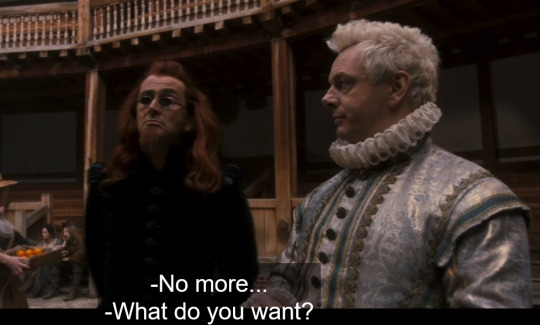
Does Aziraphale ask in this tone because he is actually feeling suspicious and curt, or because he has to sound suspicious and curt? He could be perfectly willing to do Crowley a favor and would still need to sound the way he does. It's difficult for me to believe this guy--
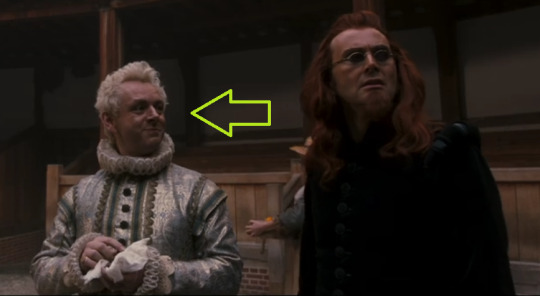
--or this guy--

--are really all that bothered by the idea that Crowley might want something from him.
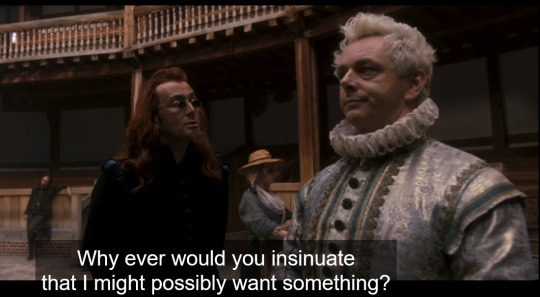
Crowley's response sounds like a(n unconvincing) protest of innocence. Maybe it is. But he doesn't disagree with the premise on which Aziraphale based his question, which means Aziraphale now has confirmation: Crowley called the meeting because he wants to ask Aziraphale to do him a favor.
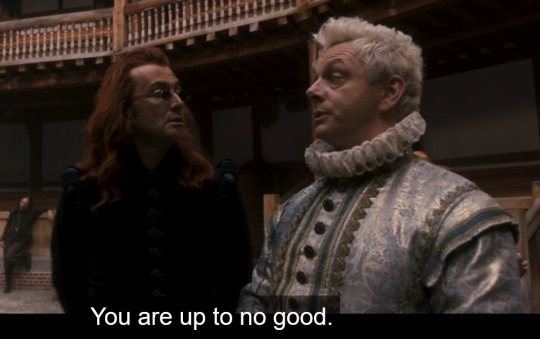
Close your eyes and listen to Sheen's delivery of this line. The way he says it is so soft it's got no judgy angelic sting to it at all. Is this really a prissy answer to Crowley's semi-rhetorical question? Or is Aziraphale using the cover of a prissy answer to ask Crowley, Is what you want related to the no-good you're up to, i.e., demon work?
Either way, Crowley answers:

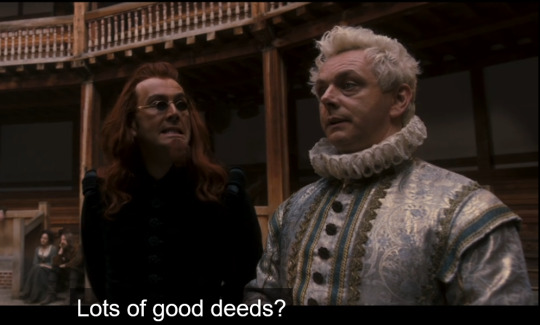
Is Crowley making a demonic jibe at Aziraphale in return to "You're up to no good," or is he telling Aziraphale, Yes, what I want from you is related to my work, and to your work, esp. what you've got on right now?
Aziraphale volunteers some information about his schedule and what it is he's got on right now.
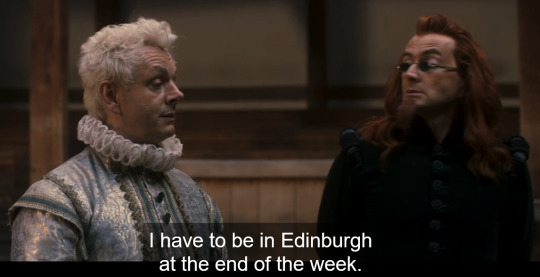
--he says, and the velvety way Crowley says "Ohhh," tells us--and could tell Aziraphale--that Crowley already knows this. In this coded communication I'm suggesting, Crowley's tone on "Oh" confirms to Aziraphale that the thing he wants help with does indeed have to do with Aziraphale's trip to Edinburgh.
So Aziraphale gives Crowley his travel details: Yeah, I have a couple of blessings and a minor miracle to perform. It's going to suck; I have to ride a horse.
Crowley's like, yeah, riding horses does suck. You have my sympathies. (Phrasing it as an insult to God: "Major design flaw if you ask me.") And then he says, I have to go to Edinburgh too this week. Tempt a clan leader into stealing some cattle.
And here's where I think Aziraphale volunteers to do Crowley's Edinburgh job for him:
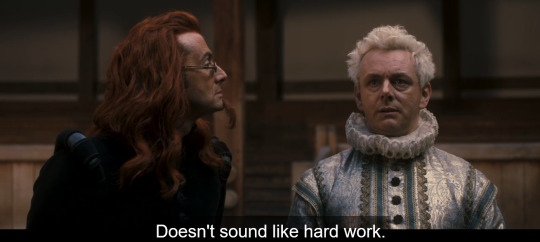
If, as I propose, Aziraphale understands already at this point that Crowley is asking him to take Crowley's Edinburgh temptation, then this response tells Crowley he's willing to do so.
And then they have a little bit of kayfabe theater and a little bit of miscommunication between themselves. Crowley suggests Aziraphale take Crowley's Edinburgh job. Aziraphale protests "You cannot actually be suggesting what I infer you're implying," even though, as Crowley immediately points, out, they've now done this dozens of times.
Now, obviously Aziraphale is pretending innocence here with "You cannot actually be suggesting," etc. But he's not pretending innocence to Crowley. He can't be: Crowley knows about the dozens of other times just like Aziraphale does. So the protest of innocence is for surveillance; it's the spirit, not the letter, of the protest itself that's genuine: I am reluctant about this.
And Crowley misses it.
He reads the surface layer of the equivocation, the Heavenly pearl-clutching; and the surface layer is where he argues. "We've done it before," he points out. "Dozens of times now. The Arrangement--"
But Aziraphale, visibly frightened and looking around, cuts him off. "Don't say that." Getting caught in an Arrangement would be much, much worse than getting caught in a one-off deal.
Why is this suddenly a problem? says Crowley. You know we've been getting away with this; you know they don't check up.
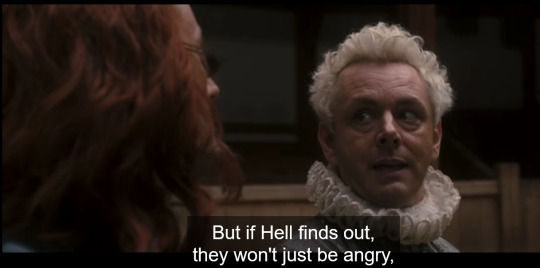
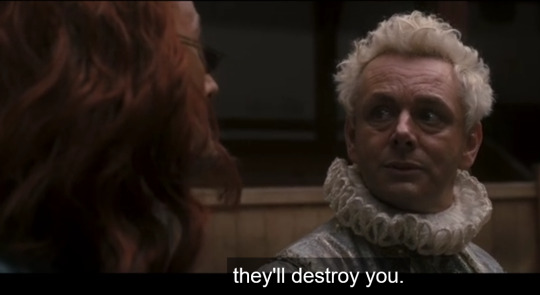
It's not pearl-clutching at all; Aziraphale is worried for Crowley's safety.
When Crowley says--
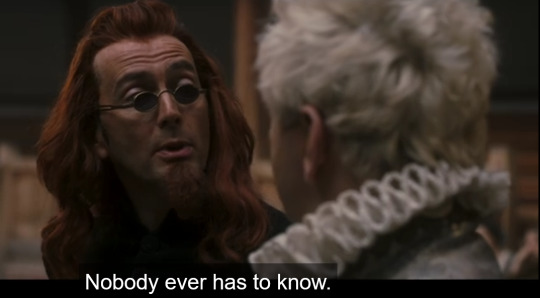
--is his tone half wheedling and half impatient because that's how he feels, or because it must sound like that? Is it soft only out of courtesy to the other people in the Globe?
There's no difference to the outcome of this scene or the story as a whole whether this romantic interpretation of the Edinburgh bickering is correct, because we've already got a solid base of evidence that the characters have romantic feelings for each other and show each other affection and care in this scene. In my opinion this interpretation fits the tone of the rest of the Globe scene better than only the face-value interpretation. What Gaiman and Mackinnon say about Crowley cheating the coin toss and Aziraphale not being aware of it can still easily apply.
While these three statements together aren't enough evidence to convict, so to speak, if my initial argument about the interpretation of "Buck up!" and Crowley's reaction is correct--and the cool stuff other people have found and pointed out suggests it is AND explains Crowley's Antony & Cleopatra line--this reading of the Edinburgh bickering is, if not ironclad, at least valid.
And holy shit, people, that makes this scene romantic af from beginning to end. I could not have asked for a better little gift from my fellow humans. 🤯I have such a better understanding of the entire 1601 scene because people from anywhere with an Internet connection sat down and spent their time sharing their ideas, and it just makes the lit-nerd lobe of my brain so happy. I love you all, you romantics and nerds and perverts.
#good omens#good omens 1601#ineffable husbands#aziracrow#it turns out my favorite good omens moment keeps going for the rest of the scene#good omens equivocation#crowley equivocation#aziraphale equivocation#good omens meta
343 notes
·
View notes
Text

🦇 the matthew patel playlist: a song-by-song breakdown
youtube music version (i usually use youtube instead of spotify)
hello matthew patel nation. how we feelin. since i'm incapable of liking this man normally, i made an in-depth playlist for him!
i've had a great time making playlists using the character playlist challenge by elijah menchaca. my choices follow the list and three rules included in the challenge: 1) one song per artist only, 2) one song per aspect/trait/relationship, and 3) eight songs minimum. i highly recommend it if you want to make in-depth and polished playlists for your favorite characters and ocs while also avoiding anything cliche.
my infodump/breakdown on this playlist (plus a Bonus playlist) can be found below the cut!

this playlist has a mix of songs that could be considered period accurate (pre-early/mid 2000s) and songs that aren't. but also we're talking about the scott pilgrim franchise so it's really not that serious.
my goal was to make a playlist that both fit his character/backstory and what i think he'd listen to, and i think i succeeded. all of my choices are based on a combo of each main depiction of matthew - in the comics, movie, and anime. this tracklist can apply to each one. this tracklist is also a combination of songs i've seen in other matthew playlists + songs i've picked out myself.
here are my choices for matthew's playlist + my reasoning:
1. their theme song: matthew patel by anamanaguchi and joseph trapanese
it's his theme song from spto! pretty self-explanatory. i love his silly lil leitmotif <3
2. how they view themselves: the ripper by the used
time takes us all so why am i not just living for today? time takes us time takes us all will i die right now? i'm only seconds away time takes us
this is one of the first songs in this playlist that has abstract lyrics. sure, matthew is not an actual mass murderer, but it's clear that he views himself in a similar edgy light. that's the kind of image he wants to portray. plus, i think the decisions he makes in canon have a reckless attitude of "fuck this, i have nothing to lose." that's what this track sounds like.
3. how they view the rest of the world: toxicity by system of a down
you, what do you own the world? how do you own disorder, disorder? now, somewhere between the sacred silence, sacred silence and sleep somewhere between the sacred silence and sleep disorder, disorder, disorder
here's another track with abstract lyrics. the lyrics of toxicity are cryptic to the point where there are probably a ton of different interpretations of what they could mean. in matthew's case, he would agree with the song's general critique of modern society, even if he might not 100% understand what's going on (both with the song and the world in general). with everything he's gone through, he's definitely wondered how he could own disorder.
4. a song about their relationship with another character: black bubblegum by the dillinger escape plan
i had gotten frozen by the way you walk by the love that you gave, by that look on your face it's a cover-up i know everything, i know everything you're made for four-letter fame regret is part of your name it's something you couldn't tell it's what you wanted to feel it's what you're dying to feel
the sound of this track fits matthew to a t, especially with greg puciato's vocal delivery. dillinger esc plan's lyrics have a similar cryptic quality to them, but the lyrics to black bubblegum are clearer compared to their other tracks. they fit matthew's relationship with and disillusion/disdain towards ramona. plus, there's the underlying yearning and obsession if you squint. it's really fun imagining matthew loving this track and getting jumpscared when he looks into the rest of dillinger's catalogue. <3
5. a song about what they want: give 'em hell, kid by my chemical romance
if you were here, i'd never have a fear so go on, live your life but i miss you more than i did yesterday (you're beautiful!)
come on. i HAD to put an mcr track in this playlist. i think matthew would connect with the three cheers era the most. the edgy hopeless romantic in him definitely self-projects onto the story of the demolition lovers. i'm saying this bc i've done that too as a big mcr fan. in general, give 'em hell, kid describes how he yearns for a life larger than what he has with someone that he loves, whether that's ramona or someone else. (matthew self-shippers unite!!)
6. a song about what’s important to them: funky galileo by sure sure
and i've been feeling so pent up like an ocean in a bathtub nobody seems to understand they're calling me an evil man when all i wanna do is dance
compared to the other songs in this playlist, this feels a little more unorthodox. but i have my reasons for it. this track has an awkward funk to it, and i mean that in a good way. yes, the song is literally about galileo and is written in his perspective, but matthew definitely has the same attitude as the lyrics. sure sure describes the first verse in this way: "everybody is giving him shit for his ideas, but he figures he’ll simply keep grooving in isolation til he dies." behind all the goofy shit that matthew does, there's a desire to prove everyone wrong and keep going.
7. a song about what they hate: glass: half-empty by hail the sun
fuck this anyway do i have to learn to live craving more than i'm given? fuck it all anyway i will never be appeased i don't know what's wrong with me i will never be appeased
if hail the sun existed in 2004, matthew would love them. i think he would view their combination of math rock and emo as mindblowing. in canon, we don't get an in-depth view of his insecurities, but i think they sound exactly like this track.
8. their Ass-Kicking Song™: bollywood by anamanaguchi
another one of his canon theme songs, this time from the sp video game.
9. a song about an event in their life: von dutch by charli xcx
it's so obvious i'm your number one i'm your number one, i'm your number one i'm your number one, yeah, it's so obvious i'm your number one, i'm your number one i'm your number one, yeah, it's so obvious
look!! it's right there!! he's literally number one! von dutch gives me the same vibes as his boost in confidence after taking gideon's place in the anime, but it could also apply to his confidence in general. matthew switches between dwelling on his shortcomings and feeling like the hottest shit in the world like whiplash.
also, the people have spoken. he would listen to it. idk i just think he would love charli. real recognizes real.
10. their “origins” song: down, set, go by underoath
i'm a half-wit boy cracking a smile and wearing it all on my sleeve so cool and so poised it's true, i'm just around to see where this thing goes, i'll never know but all i know is packing bags is a remedy, is a remedy
system of a down and underoath are probably the heaviest bands that matthew has ever listened to. he hasn't gone into the deep end yet, so this is the most that he could take. the lyrics align with the naivete and angst he experienced when he dated ramona and got dumped, especially with the callout at the end repeating, "you're not here with me! you're not here with me!"
he took it pretty badly.
11. their end credits song: out in the twilight by tally hall
stone & glass, everything balancing every saint has a sin won't it last? resident present i don't even want to ask all the light is low where the time will go all i know is that i can see anything out in the twilight
according to bryan lee o'malley, none of the evil exes died. after getting defeated by scott, they each respawn back at their homes and "(learn) their lesson." we never see what this looks like. the closest thing we get to that is seeing what becomes of them in spto, and even then, that's a completely different timeline of events. either way, whether we're talking about comic/movie matthew or series matthew, he puts his past behind in some way or another. scott pilgrim has different portrayals of the gray area between what is good and evil, since no character is a saint. out in the twilight speaks to this theme while also talking about the importance of acknowledging the past and letting it go. in comparison to the other characters, matthew did not commit the worst sins at all. he has the ability to redeem himself from the immature decisions he made and learn from them. i think that no matter what iteration of the story we're talking about, matthew can get over ramona and move on with his life. we saw him do exactly that in spto.
also i just know that matthew loves tally hall. it's peak theater kid music to me.

p.s. there are a lot of tracks that were contenders for his character playlist that didn't make the cut. i've also just found a lot of songs that i think he would listen to in general. the playlist below is where i've dumped them. suggestions are welcome! send them to me
youtube music version
to anyone who got this far: thank u so much for listening to my rambling about this goober!! i appreciate it and i hope u did too 🎉

#dividers by saradika-graphics#i had to get this out of my system. if at least one (1) person sees my vision i'll be happy#also tumblr keeps messing up the italics so if you see inconsistencies in the lyrics no you don't#whatever. go my scarab#🦇 matthewposting#💭 thoughts...#scott pilgrim#scott pilgrim takes off#scott pilgrim vs the world#spto matthew patel#scott pilgrim matthew patel#matthew patel#scott pilgrim spoilers#character playlist
10 notes
·
View notes